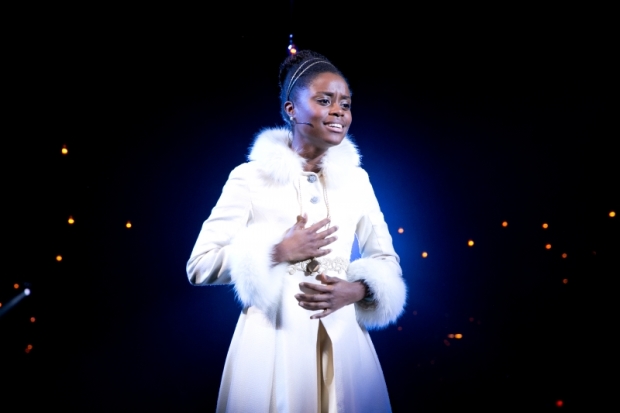Natasha, Pierre and the Great Comet of 1812

(© Evgenia Eliseeva)
Harvard University's Russian scholars will have some new ideas after watching American Repertory Theater's spectacular production of Natasha, Pierre & the Great Comet of 1812 that has transformed the Loeb Drama Center. The perceptive adaptation by Dave Malloy, who wrote the book, music, and lyrics, offers a slice of Leo Tolstoy's novel, War and Peace, as a musical. Director Rachel Chavkin embraces the joie de vivre aspects of the story and stages them in a way that allows the audience to participate.
Malloy has focused his totally sung-through musical on Anatole's unhappy seduction of Natasha, witnessed by a powerless Pierre. The war is represented by a full-length portrait of Napoleon on the wall.
Natasha and her cousin, Sonya, have arrived in Moscow from the country. Natasha is engaged to Prince Andrey, away at war, but falls for the rakish Anatole who is already married. She breaks her engagement to Andrey but the elopement is foiled by her godmother, Marya D, and Sonya to save the girl’s reputation. Pierre, an embittered nobleman who reviles his wife, Helene.He is growing to love Natasha,and asked to resolve the crisis. At the end, he determines to redeem his life, inspired by the miracle of the Great Comet of 1812.
Already scheduled for Broadway next September, featuring many members of the original off-Broadway cast, Great Comet has been expanded to fit a larger space. The concept keeps the actors moving among the audience members, scattered throughout the theater. Transformed by designer, Mimi Lien, to resemble an enormous cabaret, the theater has red velvet draped on the walls, with dozens of paintings hung on them and banquette seating for part of the audience. Lighting designer, Bradley King, has made the chandeliers into powerful images of a starry night for the climax. Musicians spill out from the doughnut-hole shaped orchestra pit in the center. The pianist-conductor-actor, Or Matias, becomes an integral part of the action, even when he shares the piano bench with Scott Stangland, in the pivotal role of Pierre.
As Natasha, Denée Benton — an appealing, white-clad ingenue with a voice of gold — strides center stage. She is in love with Prince Andrey, but cannot resist the glamorous, amoral Anatole. "Anatole is hot…Natasha is young, and Andrey isn't here," as the Prologue’s proclaims, sung by the full cast after offering platters of pierogi to the audience.
Lucas Steele as Anatole is the sexiest of villains with a voice to match his ardor and punching of the electro-pop songs. Stangland stands as one who watches, rather than participates in life (at least in this portion of Tolstoy's novel). Anatole is encouraged by his sister, Helene, the self-proclaimed '"slut,'" portrayed by Lilli Cooper. She belts a showstopper of a song in '"Charming,'" but the pair is foiled in the end by Grace McLean, Natasha's sharp-tongued godmother, Marya D and Brittain Ashford as the plaintive, heartrending witness, Sonya. Another cast standout is Paul Pinto, the knee-bending, high-kicking troika driver, hired to take the couple away from Moscow.
The cat's cradle of family relationships drives the plot along with their reactions, laid out in an elaborate chart in the program, and helped along by the opening song that explains, "It's a complicated Russian novel, everyone's got nine different names."
The staging of the full cast numbers by Chavkin and choreographer, Sam Pinkleton, depicts a rousing portrayal of Russian society, with enough folk dance patterns to suggest Jerome Robbins' dances in '"Fiddler on the Roof.'" The costumes, by Paloma Young, mix styles across the centuries, from formal, 19th-century attire to contemporary club undress.
In the end, what succeeds best is Malloy's sensitive setting of Tolstoy's thoughts to music, particularly the softly sung finale, '"The Great Comet of 1812." The creative innovations by the artistic team, the exuberance of the cast, a score that captures the mood and the period, and especially the emotional resonance of Tolstoy’s characters, combine to make this an unforgettable theatrical experience that resonances long after the stage lights have faded.










